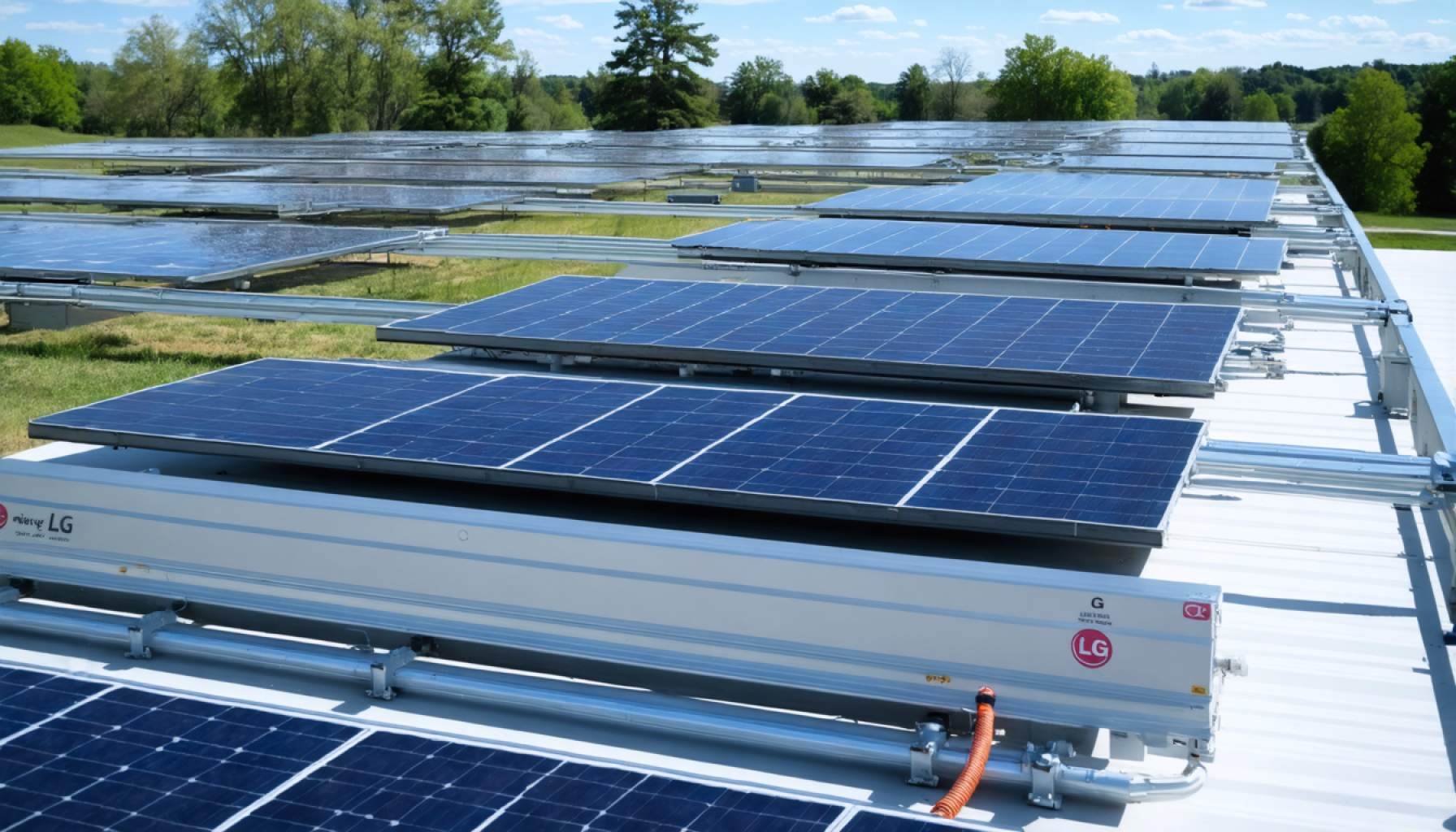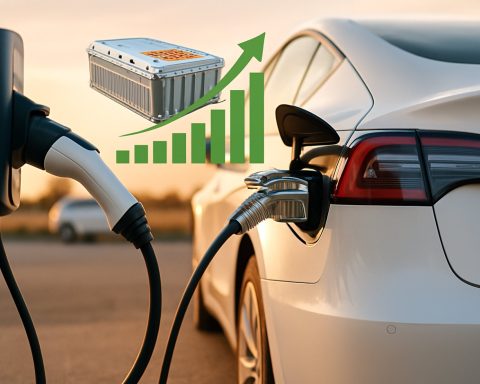- Lansing is emerging as a key player in the electrification of America’s roads, centered on LG Energy Solution’s full ownership of the Ultium battery manufacturing facility.
- LGES’s acquisition follows a $2 billion investment, nearly completing the facility, promising economic rejuvenation and safeguarding 1,360 jobs in Michigan.
- The transition marks a commitment to Lansing’s skilled workforce, aiming to revitalize Michigan’s automotive manufacturing legacy with advanced electric solutions.
- Bob Lee from LG Energy Solution highlights Michigan’s robust workforce and strategic location as crucial for sustained investment in U.S. battery production.
- Local leaders, including Bob Trezise of LEAP, envision Lansing as a hub for battery innovation, fostering investment in energy storage and electric mobility technologies.
- This transformation signals a shift towards a greener and more resilient future, positioning Lansing at the forefront of global technology trends.
Amid the electric hum of progress, Lansing stands poised to become a pivotal player in the electrification of America’s roads. The once joint venture between General Motors and LG Energy Solution (LGES) has evolved, handing LGES full ownership of the Ultium battery manufacturing facility and a fresh opportunity for Michigan’s growth. With the Strategic Fund Board’s recent approval, LGES embraces a landscape rich in innovation and industry promise, ensuring that the manufacturing epicenter will not only meet but exceed its original ambitions.
Nestled in the heart of Michigan, the nearly completed facility—construction is 98% finished—thrums with the potential to reinvigorate the local economy. Over $2 billion has already been funneled into the project, transforming it into a beacon of high-tech prowess. On the horizon, this venture promises not just state-of-the-art battery cells but will also safeguard 1,360 jobs, directly supporting Midwestern families and bolstering a community deeply intertwined with the automotive industry.
As LGES steers this initiative, it becomes more than a mere transaction; it is an act of faith in Lansing’s skilled labor force—a commitment to revitalize the region’s storied legacy of manufacturing excellence. The transition breathes life into the area, with a renewed focus on cutting-edge electric solutions, hinting at a broader renaissance of Michigan’s auto sector on the global stage.
Bob Lee, a key figure in LG Energy Solution, emphasizes Michigan’s strategic advantages, citing its robust workforce and strategic location as vital elements for sustained investment in American technologies. These decisions don’t just reflect business strategy but highlight a growing imperative to establish U.S. leadership in battery production, a sector fiercely contested worldwide.
The endorsement from local leaders, including Bob Trezise of LEAP, underscores a shared vision: to transform Lansing into a nerve center for battery innovation. The evolution of this manufacturing hub is expected to catalyze further investment and diversification, fostering a dynamic ecosystem around energy storage technologies and electric mobility.
As LGES fully embraces its role as Lansing’s new custodian, the facility heralds a new chapter in Michigan’s industrial narrative. This major shift isn’t just about producing batteries; it signifies a transition towards a greener, more resilient future. It underscores the powerful synergy between strategic foresight and local strength, charting a course toward a sustainable and electrified tomorrow.
Here in Lansing, what began as a collaboration has blossomed into a promising example of transformation—a move that reshapes not just the local landscape but the very fabric of the electric vehicle industry in America. Through this pivotal transition, LGES is set to ignite a new age of manufacturing and innovation, delivering a powerful message: Lansing is not just keeping pace with global technology trends—it’s leading them.
The Rise of Lansing: How LG Energy Solution is Transforming Michigan’s Battery Production
The Strategic Significance of LGES’s Investment
Lansing, Michigan, is rapidly evolving into a cornerstone of America’s electrification movement. With LG Energy Solution (LGES) taking full control of the Ultium battery manufacturing facility, originally a joint venture with General Motors, this marks a pivotal moment for both local and national industry landscapes. Completed at 98%, the facility has become a symbol of progress and a beacon of high-tech innovation.
How-To: Leveraging Lansing’s Electric Revolution
1. Embrace Career Opportunities: With 1,360 jobs secured, skilled workers should explore opportunities in high-tech manufacturing roles that hinge on innovative electric solutions.
2. Invest in Local Education: Educational institutions can focus on STEM programs aligned with battery technologies, preparing the next generation of engineers.
3. Develop Supporting Businesses: Entrepreneurs can tap into the growing ecosystem by offering services and products that support the battery manufacturing and electric vehicle industries.
Real-World Use Cases: Impact on the Community
– Economic Boost: With over $2 billion invested, the facility’s operations are anticipated to significantly uplift Lansing’s economy, providing local businesses with expanded opportunities.
– Environmental Impact: The production of state-of-the-art battery cells facilitates a shift towards more sustainable transport solutions, reducing the carbon footprint.
Future Trends: What Lies Ahead?
The battery sector is fiercely competitive globally, with the U.S. striving for leadership. Michigan’s pivotal role as a strategic location is decisive in transforming the nation’s position in battery production, influencing global market dynamics.
Features, Specs, & Pricing
– Cell Technology: The batteries produced are expected to support a wide range of electric vehicles, offering cutting-edge energy density and efficiency.
– Investment Scale: The facility represents a massive financial commitment, with over $2 billion already invested in creating a world-class manufacturing hub.
Pros & Cons Overview
Pros:
– Job creation for the local workforce
– Boost to the local economy and establishment of a tech hub
– Strengthening U.S. leadership in the battery production sector
Cons:
– High initial investment costs
– Dependence on market stability and continued demand for electric vehicles
Expert Insights and Predictions
Bob Lee from LG Energy Solution highlights Michigan’s advantages, pointing to a collaborative regional workforce and strategic location as key to continued investment and innovation in American technologies.
Controversies & Limitations
While the shift heralds a technological renaissance, challenges include ensuring sustainable practices and maintaining a stable supply chain in a volatile global economy.
Actionable Quick Tips
– Stay Informed: Follow industry developments through LG’s official website to keep abreast of new job postings and advancements.
– Engage with Community Initiatives: Participate in local forums and business networks to leverage emerging opportunities tied to this industrial growth.
Lansing’s development under LGES signifies an era of innovation, marking the city as a leader in battery production and electric vehicle advancement across America. The focus now shifts to maximizing the region’s potential to lead the global battery race.












